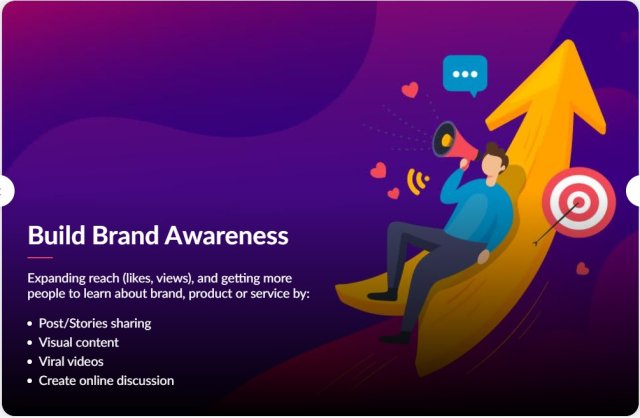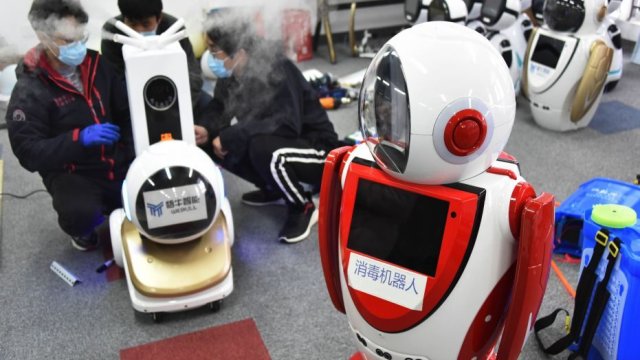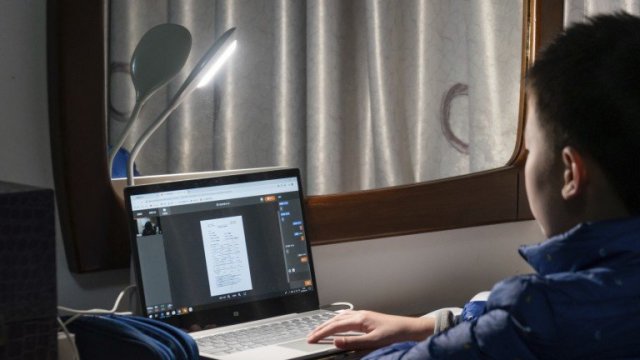5 Strange Services That Are Growing Due To The COVID-19 Outbreak
Dhir Acharya - Mar 10, 2020

The coronavirus has spread to every part of the world and has serious impacts on our lives. But these are the 5 strange services that are helping us get by.
- These Indian Cities Are Under Lockdown Again In 2021
- Foreigners Required To Take COVID-19 Anal Swab Test When Visiting China
- Countries That Have Received COVID-19 Vaccines From India
As of today, the coronavirus disease, or COVID-19, has spread to every part of the world with over 90 countries having cases. Globally, there are now over 107,000 infected cases and more than 3,600 deaths. Meanwhile, India has confirmed 43 coronavirus cases. Amid the epidemic, people are advised to avoid mass gatherings as well as traveling to disease zones, making us come up with several ways to cope with the situation while continuing our daily lives. And here are the five strange services that have emerged amid the coronavirus outbreak.
1. Online funerals
At around 3%, the death rate of COVID-19 is low compared with Ebola and SARS, but still, we have recorded deaths around the world, and it becomes difficult to hold a funeral because as much as people are sad, they also fear the disease. Or in other cases, the government may have banned public gatherings to limit the spread.

According to NAFD, it’s in talks with the UK government as well as local authorities for early guidance on how to conduct funerals. Depending on the local severity, the new guidelines will help families plan funerals for their loved ones in several ways, like holding a separate memorial service or livestreaming from a crematory facility.
The service will help funerals of the dead ones attended by families, relatives, and friends even if they’re far away or cannot come in person due to the virus.
2. Zero-touch shopping and online delivery services
Last month, petroleum and chemical corporation Sinopec launched a zero-touch vegetable sales campaign at its 6,000 gas station across 147 cities in China. This initiative allows people to order and pay for goods on the Sinopec app. To get the order, they just have to drive to the gas stations, the staff there will put their orders in their vehicles. This will help people avoid direct contact with others while shopping for food.


In another example, China’s second-largest milk company Mengniu Daily is also raising to add more vending machines to its existing systems of 10,000 machines. Specifically, people can order dairy products like milk and yogurt, then come to local machines to get their orders. Besides, the company is also shipping mass volumes of goods to other commutes so people living there don’t have to too far for shopping.
Meanwhile, China’s major coffee company Luckin Coffee has begun making disinfectants containing alcohol and hand sanitizers containing antibiotics. It will also introduce its own vending machine system for disinfectant this year.
As the Chinese government asks people to work from home if possible and even allows only one person per family to go out each day, the e-commerce industry in the country has the unique opportunity to hike. E-commerce plays like JD.com Inc., Missfresh Inc., and Alibaba Group Hema are competing to take advantage of the situation. According to JD, it shipped 71,500 tons of rice, flour, and grains in January 2020, 20 times the amount of January 2019. JD also shipped 27 million tons of cooking oil, 50,000 tons of meat, eggs, veggies, and other raw foods.
3. Livestream shopping
At a time when almost everyone has a smartphone and internet connection such a common thing in many parts of the world, livestreaming on social media like Facebook has emerged as a new, simple way of selling products. Especially with the coronavirus spreading widely, livestream shopping is getting even more popular.

Da Viral is a company in India that offers a platform on a Facebook network with over 200 million followers, allowing for choosing the most suitable influencers for livestream shopping. Those who want to know further details can contact advertise@daviral.in. Livestreaming is so convenient because viewers can see clearly the product you’re selling and they can even make questions and you can answer them quickly in the livestream, hence they can make the buying decision more quickly. This will also help people feel more comfortable and help them avoid getting out of the house to buy something.




Right now, this field needs even a larger human resource to deliver the service, like JD in China is recruiting 20,000 employees, and Da Viral is also looking for freelance sales staff with a very attractive commission scheme. If you’re interested, get more information at https://daviral.in/commission.html.
4. Robot development and manufacturing
As more and more people are in quarantine, it’s best to limit direct contact between humans as much as possible, and using robots is the perfect solution. Previously, we learned that hospitals in China were using robots to deliver food to those being quarantined, which not only helped avoid direct contact but also spared healthcare providers for other important tasks. And now, Chinese researchers just announced that they have developed a new robot that will assist doctors in diagnosing and treating patients amid the coronavirus outbreak.

The robot can carry out ultrasounds, get pharyngeal fluid, and listen to sounds from the human organs, which is normally conducted with a stethoscope. With this robot, doctors and healthcare providers won’t have to do these tasks themselves, they can even control the robot from far away. Even better, these robots is nearly 100% automatic, they can disinfect themselves after contacting patients. They are now under testing at hospitals in Beijing.
5. Online learning

In China, students are now learning through broadcast classes from the national cloud learning platform. The country has launched this with the hope to keep 180 million students able to learn while schools are closed. A new school semester was supposed to begin last month but as then postponed indefinitely due to the coronavirus outbreak.
Students can learn on TV with primary school classes broadcast on a state TV channel while senior and junior high school students can learn from 169 lessons on an online platform that covers 12 subjects. The materials are for the first week of the semester based on the national curriculum.
>>> This New Device Can Test For Coronavirus Quickly Through People's Breath
Featured Stories

Features - Jan 29, 2026
Permanently Deleting Your Instagram Account: A Complete Step-by-Step Tutorial

Features - Jul 01, 2025
What Are The Fastest Passenger Vehicles Ever Created?

Features - Jun 25, 2025
Japan Hydrogen Breakthrough: Scientists Crack the Clean Energy Code with...

ICT News - Jun 25, 2025
AI Intimidation Tactics: CEOs Turn Flawed Technology Into Employee Fear Machine

Review - Jun 25, 2025
Windows 11 Problems: Is Microsoft's "Best" OS Actually Getting Worse?

Features - Jun 22, 2025
Telegram Founder Pavel Durov Plans to Split $14 Billion Fortune Among 106 Children

ICT News - Jun 22, 2025
Neuralink Telepathy Chip Enables Quadriplegic Rob Greiner to Control Games with...

Features - Jun 21, 2025
This Over $100 Bottle Has Nothing But Fresh Air Inside

Features - Jun 18, 2025
Best Mobile VPN Apps for Gaming 2025: Complete Guide

Features - Jun 18, 2025
A Math Formula Tells Us How Long Everything Will Live
Read more

Mobile- Feb 16, 2026
Xiaomi Launches Affordable Tracker to Compete with Apple's AirTag
For users tired of ecosystem lock-in or high prices, the Xiaomi Tag represents a compelling, no-frills option that delivers core functionality at a fraction of the cost.

Mobile- Feb 17, 2026
Anticipating the Samsung Galaxy S26 and S26+: Key Rumors and Specs
The Samsung Galaxy S26 series is on the horizon, sparking excitement among tech enthusiasts.

ICT News- Feb 18, 2026
Google's Project Toscana: Elevating Pixel Face Unlock to Rival Apple's Face ID
As the smartphone landscape evolves, Google's push toward superior face unlock technology underscores its ambition to close the gap with Apple in user security and convenience.
Comments
Sort by Newest | Popular